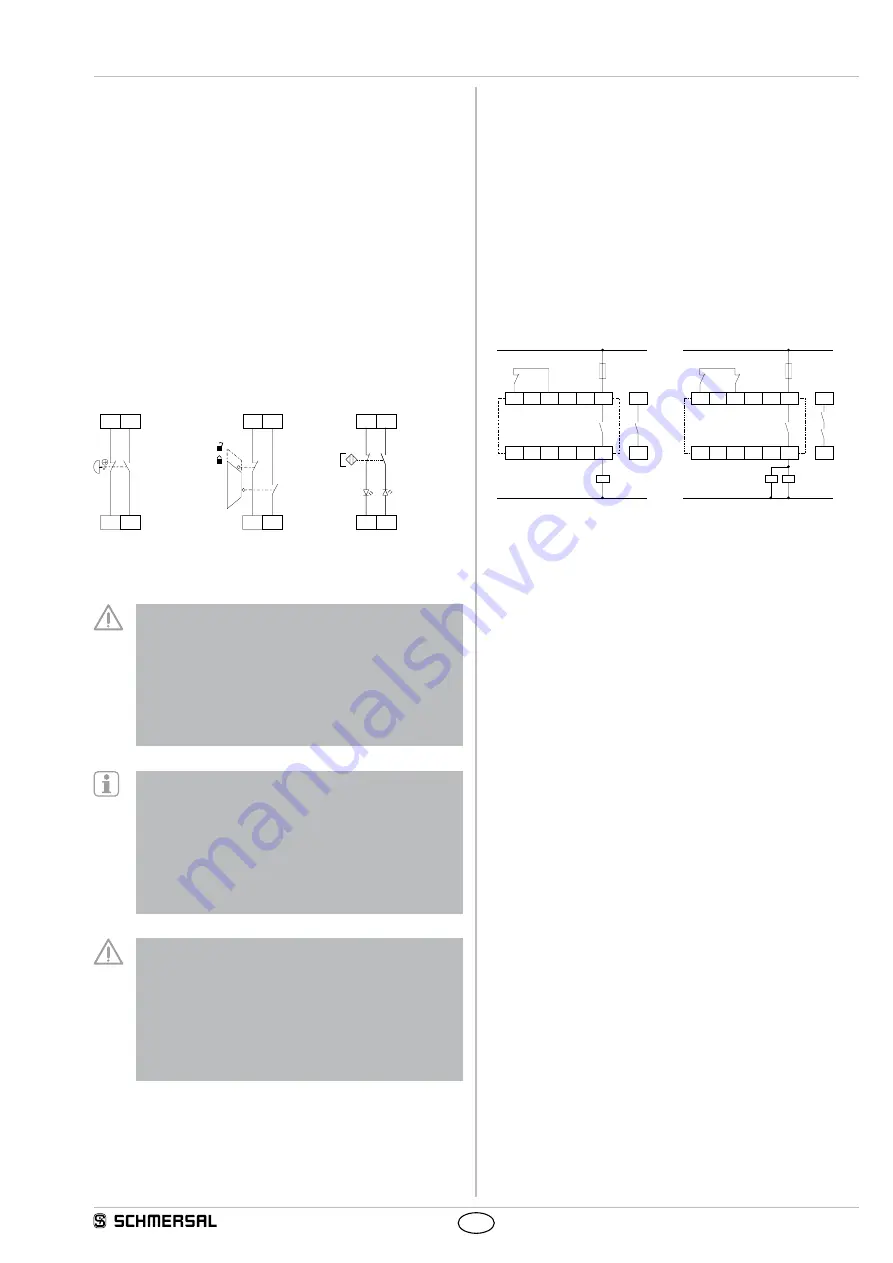
5
SRB 301AN
Operating instructions
Safety-monitoring module
EN
8.3 Sensor configuration
Dual-channel emergency stop circuit with command devices to
DIN EN ISO 13850 (EN 418) and EN 60947-5-5 (Fig. 5)
• Wire breakage and earth leakage in the control circuits are detected.
• Cross-wire shorts between the control circuits are detected.
• Category 4 – PL e to DIN EN ISO 13849-1 possible.
Dual-channel guard door monitoring circuit with interlocking
device to ISO 14119 (Fig. 6)
• With at least one positive-break position switch
• Wire breakage and earth leakage in the control circuits are detected.
• Cross-wire shorts between the control circuits are detected.
• Category 4 – PL e to DIN EN ISO 13849-1 possible.
Dual-channel control of magnetic safety switches to
EN 60947-5-3 (Fig. 7)
• Wire breakage and earth leakage in the control circuits are detected.
• Cross-wire shorts between the monitoring circuits are detected.
• Category 4 – PL e to DIN EN ISO 13849-1 possible.
S22
S21
S14
S13
S22
S21
S14
S13
S22 S14
S21 S13
Fig. 5
Fig. 6
Fig. 7
The connection of magnetic safety switches to the
SRB 301AN safety-monitoring module is only admitted when
the requirements of the standard EN 60947-5-3 are observed.
As the technical data are regarded, the following minimum
requirements must be met:
– switching capacity: min. 240 mW
– switching voltage: min. 24 VDC
– switching current: min. 10 mA
For example, the following safety sensors meet the
requirements:
– BNS33-11z, BNS33-11z-2063,
BNS33-11zG, BNS33-11zG-2237
– BNS250-11z, BNS250-11zG
– BNS120-11z
– BNS180-11z
– BNS303-11z, BNS303-11zG
– BNS260-11z, BNS260-11zG
When sensors with LED are wired in the control circuit
(protective circuit), the following rated operating voltage
must be observed and respected:
– 24 VDC with a max. tolerance of –5 %/+20 %
– 24 VAC with a max. tolerance of –5 %/+10 %
Otherwise availability problems could occur, especially in
series-wired sensors, where a voltage drop in the control
circuit is triggered by LED's for instance.
8.4 Actuator configuration
Single-channel control (Fig. 8)
• Suitable for increase in capacity or number of contacts by means of
contactors or relays with positive-guided contacts.
• If the feedback circuit
is not required, establish a bridge.
•
S
= Feedback circuit
Dual-channel control with feedback circuit (Fig. 9)
• Suitable for increase in capacity or number of contacts by means of
contactors or relays with positive-guided contacts.
• If the feedback circuit
is not required, establish a bridge.
•
S
= Feedback circuit
X1
X3
13
14
K
A
K
A
K
A
S
L1
N
X1
X3
13
14
K
B
K
A
K
B
K
A
K
B
L1
N
K
A
S
Fig. 8
Fig. 9
























